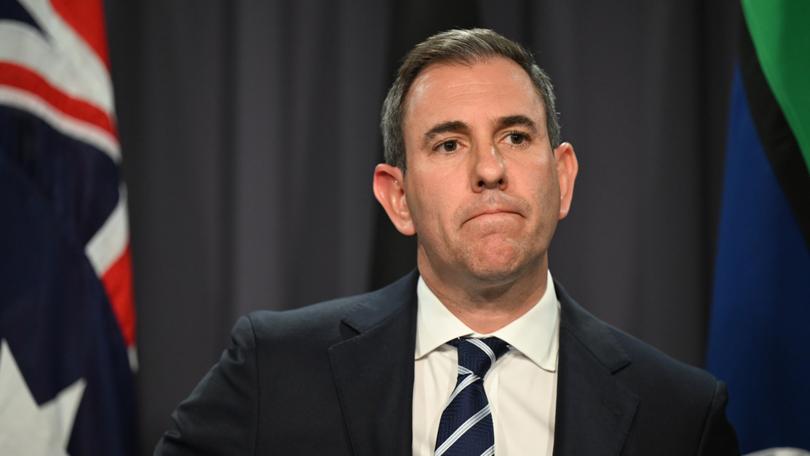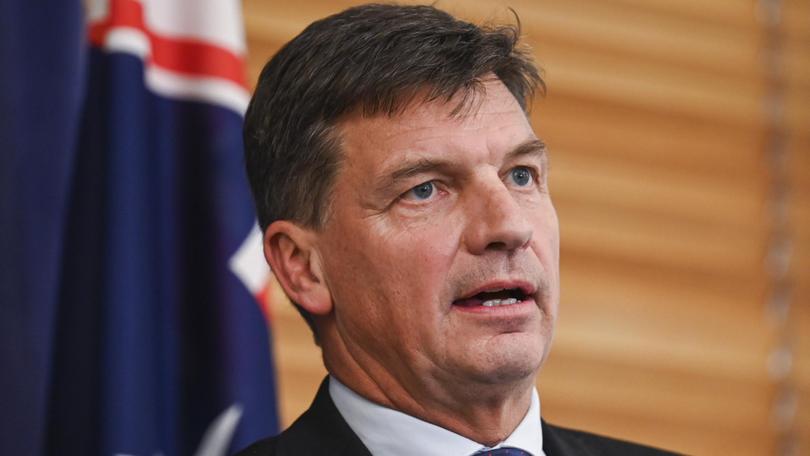Jim Chalmers reveals tumbling iron ore prices and soft labour market to hit Budget surplus
Tumbling iron ore prices and a softening labour market has hit Federal coffers, leaving Treasurer Jim Chalmers with a ‘sliver’ of the revenue windfalls that have propped up his Budget bottom line.

Tumbling iron ore prices and a softening labour market have hit Federal coffers, leaving Treasurer Jim Chalmers with a “sliver” of the revenue windfalls that have propped up his Budget bottom line for the past two years.
Dr Chalmers delivered a major economic statement in Parliament on Wednesday, setting the scene for next month’s mid-year Budget update and the economic environment that will frame the Federal election campaign.
The Treasurer said he was “confident not complacent” that the worst of the inflation storm had passed but said the task of easing pressure on households and repairing the budget was not “mission accomplished”.
Sign up to The Nightly's newsletters.
Get the first look at the digital newspaper, curated daily stories and breaking headlines delivered to your inbox.
By continuing you agree to our Terms and Privacy Policy.“There’s still more to do and plenty to lose if we don’t do more,” Dr Chalmers said.
Framing the election
He was backed in by a confident Richard Marles in his strongest question time performance while steering Parliament during Prime Minister Anthony Albanese’s absence this week.
Labor is eager to frame up an election stoush on the economy, believing that while it might be taking hits elsewhere, it has a good story to tell voters on the economic front.
Dr Chalmers made a similar statement on the economy shortly after taking office in 2022 and used the opportunity on Wednesday – in potentially the final sitting before the next election – to round out the term.
Ministers are increasingly contrasting their record with the risk they say Peter Dutton’s Opposition poses.
“This government has front and centre in its mind the cost … of living challenges which are being faced by the Australian people. So every step that we take is going to be about putting downward pressure on the costs they experience,” Mr Marles said.
“What this Leader of the Opposition represents is a material and present risk to the household budgets of every single Australian.”
Days of windfalls past
Labor has reaped the benefits of a strong labour market and high commodity prices since coming to power in 2022, averaging revenue upgrades of $80 billion in each of its four Budget updates.
The Federal Government has used the revenue boom to pay down Commonwealth debt, helping to save around $80 billion in interest payments over the decade to 2032-33.
But the days of huge windfalls are over, at least for now, with Treasury expecting any upgrade in the December update to be just a “sliver” of what was enjoyed in the past.
Dr Chalmers said Treasury also expected to revise down company tax receipts for the first time since 2020.
A softening labour market had been compounded by China’s economic slowdown, which has caused iron ore prices to tumble 30 per cent since the start of the year.
“As a result of these factors, I can inform the House that Treasury expects any revenue upgrades in the mid-year outlook will be much smaller,” Dr Chalmers said.
After posting back-to-back surpluses for the first two in almost 20 years, he is now staring at sizeable deficits through to 2027-28.
Dr Chalmers said Treasury’s latest inflation forecasts in next month’s update would be “broadly in line” with the May budget forecast, which expected prices to grow 2.75 per cent in 2024/25.
The nation’s anaemic growth is expected to continue at least in the short-term, although the Treasurer cast any progress as positive given other countries are going backwards.
Coalition claims ‘crash landing’
Responding to Dr Chalmers’ statement, shadow treasurer Angus Taylor said Labor had overseen a “crash landing” of the economy, not the “soft” descent it had boasted.
“This Treasurer has presided over an absolute collapse in our standard of living,” Mr Taylor said, pointing to the decline in household disposable income and the pressure of high interest rates on mortgage holders.
“They are worse off and, increasingly, we see an economy where aspiration feels like a luxury good.
“Increasingly we are seeing an economy where Australians believe they can’t get ahead, and that is a sad state of affairs. That is not the Australia I believe in.”

On the global front, Treasury expects growth of the 3.25 per cent in the next three years — the weakest 36 months of growth since the early 1990s.
Without naming incoming US president Donald Trump or his trade tariffs plans, Dr Chalmers reiterated that Australia’s trade-exposed economy was vulnerable to global economy headwinds.
“But we are well placed and well prepared to deal with them,” he said.
The Treasurer earlier this week downplayed the prospect of new cost-of-living relief measures in the December update or any pre-election “spend-a-thon” as the Government tightens its belt to continue containing inflation.
The Budget update will allocate funding for newly announced measures, including $900 million in incentives for the States to boost productivity.
